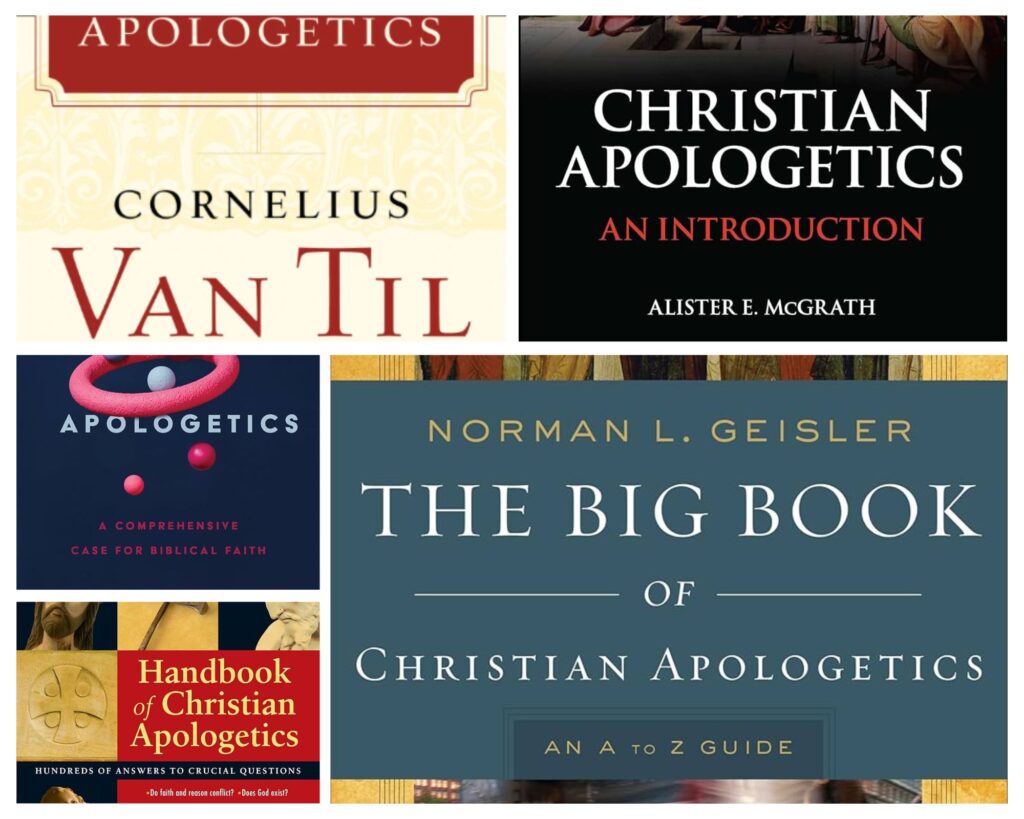Christian Apologetics

A Reasoned Defense of Christianity in a Skeptical and Searching Age
Christian apologetics aims to give a reasoned defense of the faith with gentleness and respect. From the early church to today, believers have used the Bible, philosophy, history, science, and testimony to answer objections and point people to Christ.
At its core, Christian apologetics dismantles barriers to faith and points people to the gospel.
Table of Contents
– Greg L. Bahnsen
Table of Contents
What is Christian Apologetics?

Apologetics is the task of presenting a well-reasoned, intellectual defense of the truth claims of the Christian faith. (Ligonier)
Apologetics comes from the Greek word apologia, meaning a “defense” or “reasoned argument.” In the New Testament, the term appears in 1 Peter 3:15, where believers are commanded:
“but in your hearts honor Christ the Lord as holy, always being prepared to make a defense to anyone who asks you for a reason for the hope that is in you; yet do it with gentleness and respect,”
From a Christian perspective, apologetics is simply this: explaining why we believe what we believe about Jesus and the truth of the Bible.




Why Christian Apologetics Matters Today
- 66% of young adults raised in church leave the faith during their college years (Lifeway).
- Only 20% of adults now say the Bible is the literal Word of God – a record low (Gallup).
- 33% of Americans report attending monthly religious services, down from 54% in 2007. (Pew)
- 28% of Americans now identify as religiously unaffiliated (“nones”), up dramatically from a few years ago. (Pew)
“The chief reason people do not know God is not because He hides from them but because they hide from Him.”
Core Elements in
Effective Christian Apologetics

Biblically Based:Defending the faith begins with God’s Word as our ultimate authority.
Reasoned Defense: Using logic, evidence, and clarity to show Christianity is true.
Worldview Engagement: Respectfully comparing and responding to other belief systems.
Practical: Every Christian should be able to talk with others about faith.
Evangelistic: Aims not just to win arguments but to lead people to Christ.
Scriptural Basis for Christian Apologetics
Here are several passages that establish the biblical foundation for Christian apologetics:
| Bible Address | Verse |
|---|---|
| 1 Peter 3:15 | But in your hearts honor Christ the Lord as holy, always being prepared to make a defense to anyone who asks you for a reason for the hope that is in you; yet do it with gentleness and respect. |
| Jude 3 | Beloved, although I was very eager to write to you about our common salvation, I found it necessary to write appealing to you to contend for the faith that was once for all delivered to the saints. |
| 2 Corinthians 10:5 | We destroy arguments and every lofty opinion raised against the knowledge of God, and take every thought captive to obey Christ. |
| Acts 17:2-3 | And Paul went in, as was his custom, and on three Sabbath days he reasoned with them from the Scriptures, explaining and proving that it was necessary for the Christ to suffer and to rise from the dead, and saying, ‘This Jesus, whom I proclaim to you, is the Christ.' |
| Proverbs 26:5 | Answer a fool according to his folly, lest he be wise in his own eyes. |
| Colossians 4:5-6 | Walk in wisdom toward outsiders, making the best use of the time. Let your speech always be gracious, seasoned with salt, so that you may know how you ought to answer each person. |
“Men despise religion. They hate it and are afraid it may be true. The cure for this is first to show that religion is not contrary to reason, but worthy of reverence and respect. Next make it attractive, make good men wish it were true, and then show that it is.”
Historical Context of Christian Apologetics
Apologetics is not a new invention. Throughout history, there have been many teachers who have defended the Christian faith against other worldviews. These prominent apologists can be divided into several distinct eras.

Patristic & Ante-Nicene Period
(2nd–4th centuries)
Justin Martyr (100–165): Early Christian apologist who defended the faith before Roman authorities.
Origen of Alexandria (185–253): Theologian and apologist who wrote “Contra Celsum” in defense of Christianity.
Athanasius of Alexandria (c. 296–373 AD): Bishop and apologist who defended the deity of Christ and the Trinity against Arianism.
Medieval Period
(5th–15th centuries)
Anselm of Canterbury (1033–1109): formulated the Ontological Argument for God’s existence (Proslogion).
Thomas Aquinas (1225–1274): developed the “Five Ways” arguments for God’s existence (Summa Theologica).
Peter Abelard (1079–1142): aimed for rational arguments for Christian doctrines (Sic et Non).
Post-Reformation / Early Modern Period
(16th–19th centuries)
Hugo Grotius (1583–1645): Wrote The Truth of the Christian Religion in Six Books, a rational defense of Christianity.
Blaise Pascal (1623–1662): his Pensées presented the famous “Pascal’s Wager” as a practical apologetic.
Contemporary Period
(20th–21st centuries)
G.K. Chesterton (1874–1936): known for Orthodoxy and The Everlasting Man, he supplied memorable and witty defenses of Christian truth.
B.B. Warfield (1851–1921): Princeton theologian who defended biblical inerrancy and the authority of Scripture.
C.S. Lewis (1898–1963): Oxford professor and author of Mere Christianity, Lewis made a powerful case for the reasonableness of Christianity through clear and imaginative writing.
Cornelius Van Til (1895–1987): Reformed theologian and philosopher who pioneered presuppositional apologetics, arguing that all reasoning depends on the truth of God’s Word.
Francis Schaeffer (1912–1984): A pastor, philosopher, and founder of L’Abri, Schaeffer challenged secular culture and called Christians to live out a biblical worldview.
Norman Geisler (1932–2019): A prolific apologist and co-author of I Don’t Have Enough Faith to Be an Atheist, Geisler defended biblical inerrancy and classical Christian theism.
Alvin Plantinga (1932– ): Leading Christian philosopher, Plantinga revitalized the philosophy of religion with arguments for the rationality of belief in God.
Approaches to Christian Apologetics (Methods)
Christians throughout history have approached apologetics in different ways.
Presuppositional Apologetics
This method begins with the conviction that the truth of the Bible is the foundation for all knowledge and reasoning. Instead of trying to prove God’s existence through neutral evidence, presuppositionalists argue that non-Christian worldviews collapse under their own assumptions and cannot account for reality, morality, or logic. Only the Christian worldview makes sense of life, truth, and reason itself.
Classical Apologetics
This approach begins with natural theology and philosophy. A classical apologist first argues that God exists through reason (cosmological, teleological, or moral arguments). Then, they defend the reliability of the Bible as God’s Word and finally present the truth of Christianity. It’s a method that builds a case from general revelation to specific Christian claims.
Evidential Apologetics
Evidentialists emphasize specific evidence to make the case for Christianity, especially historical evidence such as the resurrection of Jesus, fulfilled prophecy, and miracles. The goal is to show that Christianity is supported by verifiable facts. This method often appeals to skeptics with data and logical inference from evidence.
Reformed Epistemology
This approach argues that belief in God can be rational and justified apart from traditional evidence or arguments. It holds that humans are created with an innate capacity to recognize God’s existence. Reformed epistemology emphasizes that faith in God is reasonable even without appealing to external evidence, since God Himself has made His reality knowable.
Experiential Apologetics
This approach appeals to the transformative power of Christianity in the lives of individuals and communities. It emphasizes testimony, spiritual experience, and the inner witness of the Holy Spirit as confirmation of God’s reality. Experiential apologetics highlights how Christ changes lives in ways that reason and evidence alone cannot explain.
“The God of Scripture tells us that he cannot possibly not exist. He presents himself as the self-referential source of all that exists in the universe.”
Key Branches of Christian Apologetics
1
Biblical Apologetics
- Authority of Scripture: Why trust the Bible?
- Reliability of the New Testament manuscripts.
- Fulfilled prophecy as evidence of divine inspiration.
2
Philosophical Apologetics
- Arguments for God’s existence (Cosmological, Teleological, Moral).
- Answering atheism and naturalism.
- Why truth is objective, not relative.
3
Scientific Apologetics
- Creation vs. evolution.
- The fine-tuning of the universe.
- Creation pointing to a Creator.
4
Historical Apologetics
- Evidence for the resurrection of Jesus.
- The reliability of eyewitness testimony.
- The growth of the early church as proof of the risen Christ.
5
Cultural Apologetics
- Responding to secularism, relativism, and materialism.
- Addressing questions about morality, sexuality, and ethics.
- Showing how the Christian worldview makes sense of beauty, meaning, and purpose.
6
Worldview Apologetics
- Comparing Christianity with Islam, Hinduism, Buddhism, and secular humanism.
- Understanding New Age spirituality and reincarnation.
- Showing why only Christianity answers the deepest questions of life.
How to Do Christian Apologetics with Gentleness and Respect
Apologetics is not just about arguments: it’s about honoring God and loving people. The Bible calls us to give a defense for our hope “with gentleness and respect” (1 Peter 3:15). Here are some practical steps to help you do that in a God-honoring way:
Pray for Wisdom and Humility
Before you speak, pray for God’s guidance. Ask him for clarity, humility, and love for the person you’re engaging.
Listen Carefully Before Answering
Show respect by listening well. Understanding someone’s questions fully demonstrates compassion and helps you respond wisely.
Ask Clarifying Questions
Instead of jumping straight into defense, ask questions that draw out deeper thinking: “What do you mean by that?” or “Why do you believe that?” This can open a more meaningful dialogue.
Learn and Understand Their Worldview
Take time to study the worldview of the person you’re engaging. By understanding where someone is coming from, you can respond in a way that connects with their deeper concerns.
Share Truth with Scripture and Testimony
Use the Bible as your foundation. The Word of God is powerful (Hebrews 4:12). Share how Christ has personally changed your life. Both truth and story together make a powerful witness.
Leave the Results to God
Your role is to plant and water the seeds of truth; only God can change hearts (1 Corinthians 3:6-7). Trust Him with the outcome.
At its heart, apologetics is an act of love. Christian apologetics done well helps believers grow confident in their faith and points non-believers to Jesus with both truth and grace.
Trusted Christian Apologetics Resources
For believers who want to grow in defending the faith with biblical clarity, these ministries and resources provide training, tools, and encouragement:
- Got Questions: Offers accessible, Bible-based answers to hundreds of thousands of apologetics questions online..
- CARM (Christian Apologetics & Research Ministry): Offers a large Q&A database, articles, forums, and refutations of common objections to Christianity.
- CrossExamined (Frank Turek): Known for "I Don’t Have Enough Faith to Be an Atheist," this ministry emphasizes practical, evidence-based apologetics for everyday conversations.
- Stand to Reason (Greg Koukl): Equips Christians to think clearly and engage persuasively with culture through articles, podcasts, and the Tactics approach to apologetics.
- Apologetics Press: A biblically sound ministry offering resources on the reliability of Scripture, creation science, and responses to skeptics.
- Ligonier Ministries: Founded by R.C. Sproul, Ligonier provides classic apologetics teaching on Scripture’s authority, God’s existence, and the rationality of the faith.
- Probe Ministries: Provides apologetics and worldview resources through articles, podcasts, and teaching to help Christians engage culture with confidence.
- Answers in Genesis: Focuses on biblical authority, creation apologetics, and countering evolutionary narratives.
- Christian Research Institute (Hank Hanegraaff): Known as “The Bible Answer Man,” CRI equips believers to defend the faith and discern truth from error.
- Discovery Institute (Center for Science and Culture): Promotes intelligent design research and resources addressing science and faith.
Frequently Asked Questions (FAQ) About Christian Apologetics
Do I need to be a scholar to practice apologetics?
No. Every Christian can learn to give reasons for their faith. You don’t need a PhD to explain why you believe in Jesus—you just need clarity, Scripture, and humility.
Isn’t faith supposed to be “blind”? Why use evidence?
Biblical faith is trust based on truth. The Bible itself appeals to evidence (fulfilled prophecy, eyewitness accounts of the resurrection). Apologetics strengthens faith by showing Christianity is true and reasonable.
How do I avoid being argumentative in apologetics?
Apologetics is not about winning debates but about pointing people to God through Christ. Respectful engagement means listening well, answering clearly, and sharing the gospel with humility.
What if I don’t know the answer to a tough question?
It’s okay to admit you don’t know. You can always research and return later with a thoughtful response. The key is to be engaged and honest.
What makes Christianity different from other religions?
Other religions may contain moral teachings, but only Christianity deals with the problem of sin and offers salvation through the death and resurrection of Jesus Christ.
Trusted Christian Apologetics Articles
For those seeking to deepen their understanding and defense of the Christian faith, here are several articles:







